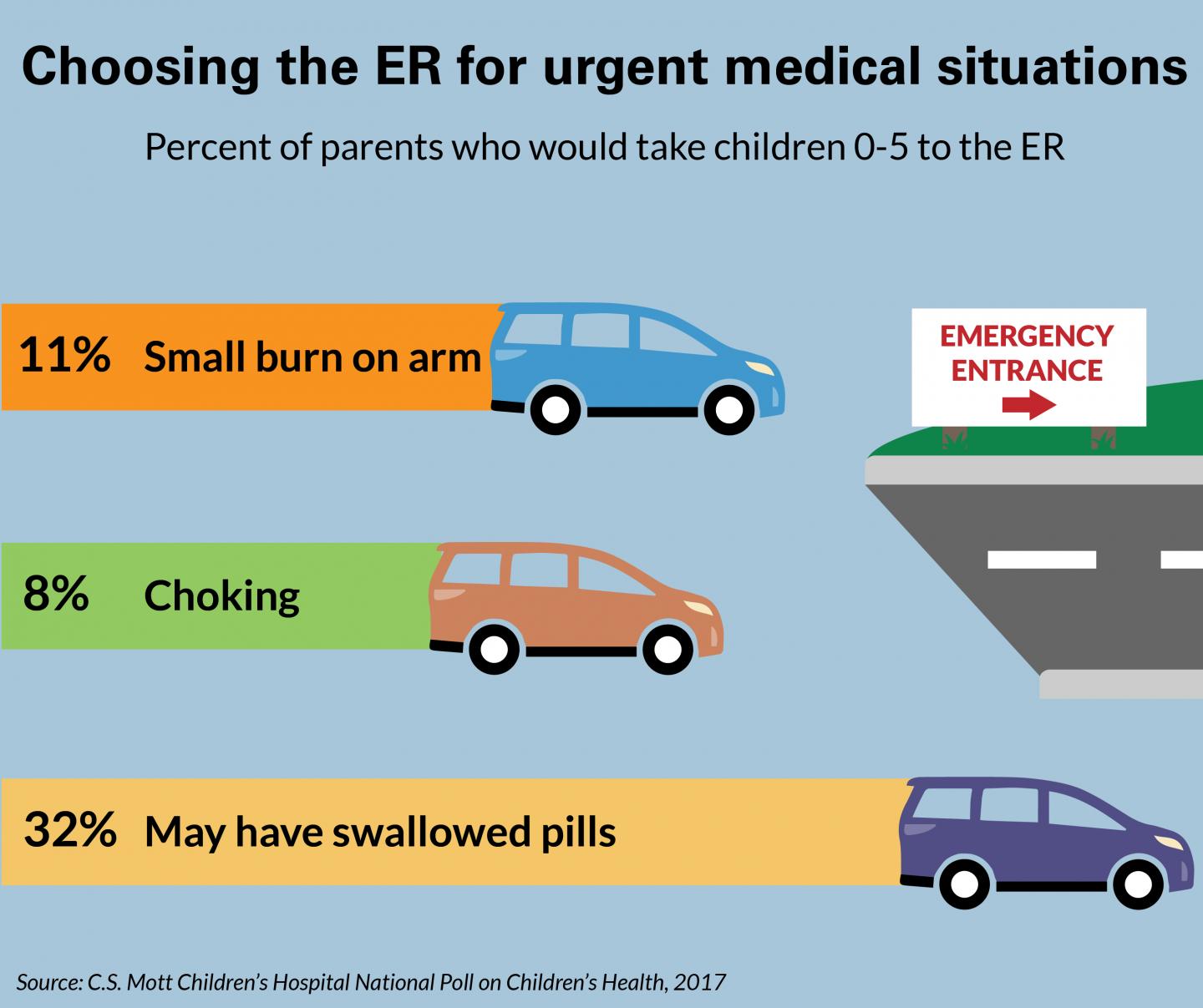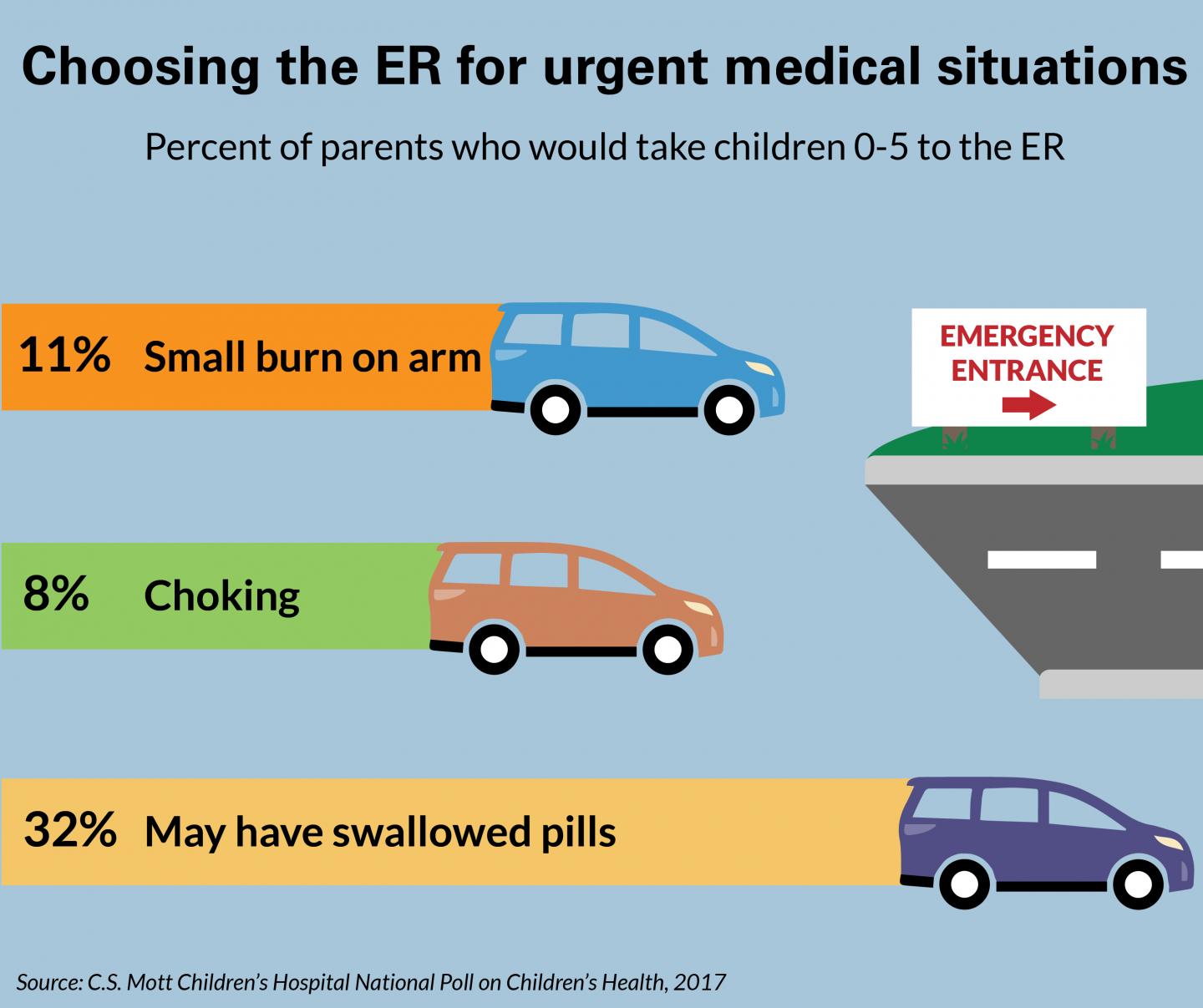
Credit: C.S. Mott Children's Hospital National Poll on Children's Health at the University of Michigan
ANN ARBOR, Mich. — If a child gets a small burn from a hot pan, starts choking or swallows medication, parents may struggle to decide whether to provide first aid at home or rush them to the hospital, suggests a new national poll.
Only half of parents were confident that they would know what to do if their child were choking and 1 in 10 parents would immediately take their child to the ER for a minor burn, according to C.S. Mott Children's Hospital National Poll on Children's Health at the University of Michigan. Nearly a third of parents would take their child to the emergency room for swallowed pills.
The nationally representative survey includes responses from 386 parents with least one child ages 0-5.
"When young children experience urgent medical situations, parents have to make decisions about whether to administer first aid at home, call for advice or seek emergency care," says Gary Freed, M.D., M.P.H., a Mott professor of pediatrics and the poll's co-director.
"Our report suggests that some parents may be using the ER for common situations that could be handled at home. True emergencies warrant hospital trips, but determining what is in fact an 'emergency' can be a confusing and nerve-wracking experience for parents who want to make the right decision."
While going to the ER may give parents reassurance that their child is fine, there are downsides, Freed notes. For example, a child who is choking would benefit more from immediate help instead of delaying action through a trip to the hospital.
Most parents indicated that their instant response to choking would be to try to dislodge the object through a combination of tactics, such as the Heimlich maneuver (69 percent), trying to remove the object with their finger (54 percent), hitting the child on the back (48 percent), or turning the child upside down (25 percent).
Twenty-nine percent would call 9-1-1 if their child was choking, while 8 percent would take the child directly to the ER.
Half of parents were very confident they would know what to do if their child swallowed medication. Immediate responses included trying to remove any pills from the child's mouth (53 percent) or making the child throw up (26 percent). Many parents would call Poison Control (61 percent), their child's doctor (25 percent) and/or 9-1-1 (26 percent) to get advice. Another 32 percent would immediately take the child to the ER.
"Generally, calling Poison Control is an excellent first step to take if a parent suspects their child swallowed something harmful. Poison Control staff are trained to get important information from parents about the type of medication their child might have swallowed and direct them on the next steps to take," says Freed.
"Also, in the heat of the moment, parents who rush to the ER might forget to bring the source of the possible poisoning, leaving ER providers with limited information to determine the child's treatment."
Four in 10 parents (43 percent) had never received first aid training and they were also the least confident in making decisions about urgent situations compared to parents with first aid training. Ten percent of parents said they had received first aid training within the past year, 24 percent had training 1-5 years ago, and 23 percent more than 5 years ago.
"Even with appropriate supervision, young children experience urgent medical scenarios, and many parents may be unprepared. We found that parents who had recent first aid training were more confident in handling common medical situations," Freed says.
"In some cases, such as a small burn, parents would likely be able to consult a first aid resource to guide their response. Other situations, like choking, are clearly more time-sensitive and require immediate action. First aid training can help parents stay calm and manage the situation more effectively."
###
Media Contact
Beata Mostafavi
[email protected]
734-764-2220
@umichmedicine
http://www.med.umich.edu





